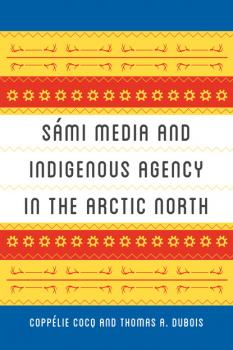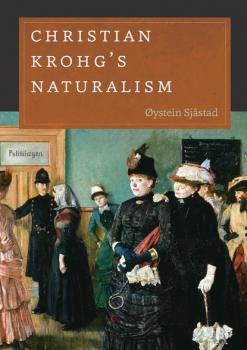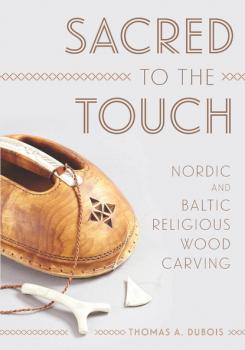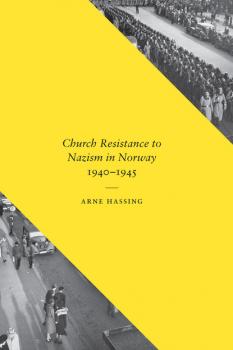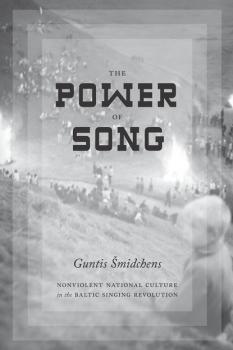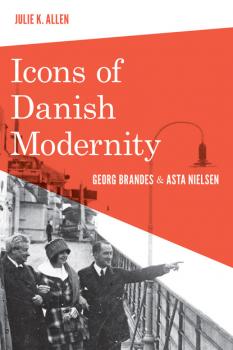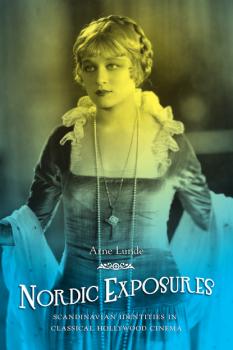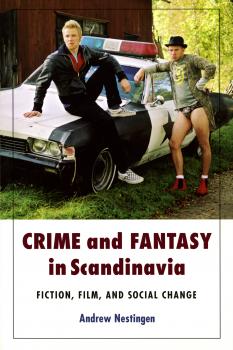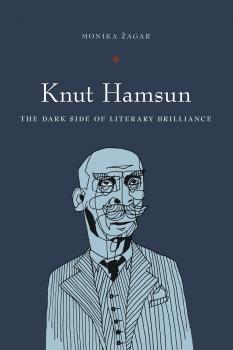New Directions in Scandinavian Studies
Скачать книги из серии New Directions in Scandinavian StudiesSámi Media and Indigenous Agency in the Arctic North
Digital media–GIFs, films, TED Talks, tweets, and more–have become integral to daily life and, unsurprisingly, to Indigenous people’s strategies for addressing the historical and ongoing effects of colonization. In Sámi Media and Indigenous Agency in the Arctic North , Thomas DuBois and Coppélie Cocq examine how Sámi people of Norway, Finland, and Sweden use media to advance a social, cultural, and political agenda anchored in notions of cultural continuity and self-determination. Beginning in the 1970s, Sámi have used Sámi-language media—including commercially produced musical recordings, feature and documentary films, books of literature and poetry, and magazines—to communicate a sense of identity both within the Sámi community and within broader Nordic and international arenas.In more contemporary contexts—from YouTube music videos that combine rock and joik (a traditional Sámi musical genre) to Twitter hashtags that publicize protests against mining projects in Sámi lands—Sámi activists, artists, and cultural workers have used the media to undo layers of ignorance surrounding Sámi livelihoods and rights to self-determination. Downloadable songs, music festivals, films, videos, social media posts, images, and tweets are just some of the diverse media through which Sámi activists transform how Nordic majority populations view and understand Sámi minority communities and, more globally, how modern states regard and treat Indigenous populations.
Christian Krohg's Naturalism
The Norwegian painter, novelist, and social critic Christian Krohg (1852�1925) is best known for his highly political paintings of workers, prostitutes, and Skagen fishermen of the 1880s and for serving as a mentor to Edvard Munch. One of the Nordic countries� most avant-garde naturalist artists, he was highly influenced by French thinkers, including Emile Zola, Claude Bernard, and Hippolyte Taine, and shocked the provincial sensibilities of his time. Krohg�s work reached beyond the art world when his book Albertine and its related paintings were banned upon publication. The story of a young seamstress who turns to a life of prostitution, it galvanized support for outlawing prostitution in Norway, but Krohg was punished for its sexual content.In Christian Krohg�s Naturalism, Oystein Sjastad examines the theories of Krohg and his fellow naturalists and their reception in Scandinavian intellectual circles, viewing Krohg from an international perspective and demonstrating how Krohg�s art made a striking contribution to European naturalism. In the process, he provides the definitive account of Krohg�s art in the English language.
Sacred to the Touch
With near-mythical forests of birch and pine, the Nordic and Baltic countries boast a rich tradition of religious wood carving that is in many ways emblematic of their cultures. Sacred to the Touch examines the spiritual and intellectual projects of six twentieth- and twenty-first-century artists who have adapted and revitalized this tradition. Through interviews and analyses, folklorist Thomas A. DuBois explores the notions of continuity with the past that these artists seek to express through their art, examining the forest church of late Finnish artist Eva Ryyn�nen, the carvings of Norwegian Americans Phillip Odden and Else Bigton that decorate a planned replica of a stave church in Southern California, the medieval Catholic-rooted work of Lutheran Sister Lydia Mariadotter (Swedish), the grave markers and roadside figures of Algimantas Sakalauskas (Lithuanian), and the merging of Lutheran and pre-Christian traditions by Lars Levi Sunna (S�mi). With color photographs and detailed descriptions, Sacred to the Touch reveals the interplay of tradition with personal and communal identity that characterize modern religious carving in Northern Europe.
Danish Folktales, Legends, and Other Stories
Danish Folktales, Legends, and Other Stories is a collection of translated and annotated Nordic folklore that presents full repertoires of five storytellers along with extensive archival material. The printed book presents some of the most compelling stories of these five important storytellers along with historical and biographical introductions. Of a length suitable for course use, it provides a substantive and enjoyable encounter with Danish folklore. The Danish Folklore Nexus on the accompanying DVD includes the storytellers' full repertoires plus 500 additional stories in both Danish and English along with essays on the changing political, social, and economic landscapes of nineteenth-century Denmark, the history of folklore scholarship, critical approaches to folklore, and comprehensive biographies of the storytellers. It also provides links between related stories and interactive maps that allow readers to see where the stories are set and where they were collected, and a mechanism to search for themes and topics across all the stories.The basis of the work is the collection of Evald Tang Kristensen (1843-1929). As a young schoolteacher Kristensen set out across Denmark to collect the folktales, ballads, legends, and stories that he saw as the vestiges of a disappearing folk culture. Over the course of five decades he collected thousands of stories and kept detailed biographical notes about the storytellers he met.Watch the trailer: http://www.youtube.com/watch?v=ecojItKZ8SI&list=UUge4MONgLFncQ1w1C_BnHcw&index=2&feature=plcp
Church Resistance to Nazism in Norway, 1940-1945
Church Resistance to Nazism in Norway, 1940-1945 examines the evolution of the Lutheran state Church of Norway in response to the German occupation. While German Protestant churches generally accepted Nazism and state incorporation, Norway�s churches rejected both Nazism and ideological alignment. Arne Hassing moves through the history of the Church of Norway�s relationship to the Nazi state, from its initial confused complicities to its open resistance and separation. He writes engagingly of the people at the center of this struggle and reflects on how the resistance affected the postwar church and state.
The Power of Song
The Power of Song shows how the people of Estonia, Latvia, and Lithuania confronted a military superpower and achieved independence in the Baltic �Singing Revolution.� When attacked by Soviet soldiers in public displays of violent force, singing Balts maintained faith in nonviolent political action. More than 110 choral, rock, and folk songs are translated and interpreted in poetic, cultural, and historical context.Watch the trailer: http://www.youtube.com/watch?v=Gh7vFFjK0rc
Icons of Danish Modernity
Julie Allen utilizes the lives and friendship of the Danish literary critic George Brandes (1842-1927) and the silent film star Asta Nielsen (1881-1972) to explore questions of culture and national identity in early twentieth-century Denmark. Danish culture and politics were influenced in this period by the country's deeply ambivalent relationship with Germany. Brandes and Nielsen, both of whom lived and worked in Germany for significant periods of time, were seen as dangerously cosmopolitan by the Danish public, even while they served as international cultural ambassadors for the very society that rejected them during their lifetimes. Allen argues that they were the prototypical representatives of a socially liberal and culturally modern «Danishness» ( Danskhed ) that Denmark itself only gradually (and later) grew into.This lively study brings its central characters to life while offering an original, thought provoking analysis of the origins and permutations of Danish modernism and Danish national identity–issues that continue to be significant in today's multi-ethnic Denmark. Icons of Danish Modernity is a book about the uneasy waves that arise when celebrities take on national symbolism, and the beginnings of this formula in the early twentieth century.
Nordic Exposures
Nordic Exposures explores how Scandinavian whiteness and ethnicity functioned in classical Hollywood cinema between and during the two world wars. Scandinavian identities could seem mutable and constructed at moments, while at other times they were deployed as representatives of an essential, biological, and natural category. As Northern European Protestants, Scandinavian immigrants and emigres assimilated into the mainstream rights and benefits of white American identity with comparatively few barriers or obstacles. Yet Arne Lunde demonstrates that far from simply manifesting a normative unmarked whiteness, Scandinavianness in mass-immigration America and in Hollywood cinema of the twentieth century could be hyperwhite, provisionally off-white, or not even white at all.Lunde investigates key silent films, such as Technicolor's The Viking (1928), Victor Sjostrom's He Who Gets Slapped (1924), and Mauritz Stiller's Hotel Imperial (1927). The crises of Scandinavian foreign voice and the talkie revolution are explored in Greta Garbo's first sound film, Anna Christie (1930). The author also examines Warner Oland's long career of Asian racial masquerade (most famously as Chinese detective Charlie Chan), as well as Hollywood's and Third Reich Cinema's war over assimilating the Nordic female star in the personae of Garbo, Sonja Henie, Ingrid Bergman, Kristina Soderbaum, and Zarah Leander.
